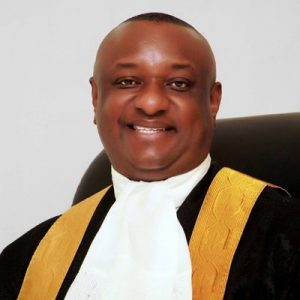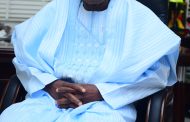In what appears an unending relay of mud throwing at each other, President Buhari is accusing Alhaji Atiku Abubakar, the flag bearer of the People’s Democratic Party, (PDP) of promoting the ideology that becoming wealthy by abusing public office is not a bad thing. His campaign organisation which spoke on his behalf dismissed Atiku’s allegations of the president’s relations becoming prime shareholders in a choice telecommunication company and a bank, transforming from the paupers they were four years ago into billionaire investors.

Festus Keyamo of the Buhari Campaign Organisation who issued the statement
The campaign organization’s statement argued how the president had clarified those allegations before, proceeding to cite and rely substantially on the 2010 US Senate Committee on Homeland Security and Government Affairs’ mention of Atiku in a four case study of keeping foreign corruption out of that country. Although the report which has been circulating and is downloadable is not specifically on Atiku but on the phenomenon in question, the Buhari campaign organization is relying on it and other local investigations to ask: How do we as a Nation end up with anyone with this sordid record locally and internationally?”
The statement disagrees with those who absolutise the US Justice Department’s declaration of having no case pending against the PDP flag bearer, saying that there is, indeed, a Sealed Indictment against the former Vice-President that will be put into effect the day Atiku should arrive in the US.
Pushing the onus of proof to those who allege, President Buhari is saying that his challenger has evaded tax for the past three year, wondering how a tax evader could get the nation working again without deceiving himself.
This round of allegations and counter allegations which has seized the high ground in the on-going struggle for power in Nigeria, however, crept up in a very surprising manner. The President told some of his callers on Christmas Day that his anti-corruption war had been a slow motion in spite of himself. In other words, he meant the Nigerian system has made it difficult for him to be faster. The PDP flag bearer responded by saying that could not be correct because, even as constrained as the system might be, it allowed the president to have dealt with a number of cases that he, (Atiku) listed. These included the corruption allegations which led to the exit of the former Secretary to the Government of the Federation, the $25b NNPC contracts allegedly awarded outside of the procedures and the case of Abdulrasheed Maina in the Pension fund scandal. According to Atiku, Buhari could have dealt with these if he were not the type of person he is.
The brickbats took a dramatic turn when the president responded to this by saying that Atiku would have been in jail by now if the system were working. The drama took further turn when Atiku replied by claiming that some relations of the president who could not even transport themselves around four years ago have since become billionaire investors, courtesy of power. It is to that the Buhari campaign organization is responding by asking the PDP to prove it.

The cartoonist seems to be asking: Why the temptation to war if it is all about serving the people?
These exchanges might be entertaining but it also signposts the danger in a Buhari – Atiku contest for power. The language of the exchanges bear the contempt each camp has for the other as for the conversation to be civilized as demanded by democracy. Buhari followers think Atiku Abubakar is just too corrupt to even think of being Nigeria’s president. Last November, a presidential aide even hinted the impossibility of Atiku becoming president of Nigeria, calling it a dream. Atiku’s followers, on the other hand, think Buhari is too much of a hypocrite and a despot, keen on using power to torment his opponents. The question this throws up is, why is not possible to let the people decide if each of them aspires to serve the people and nothing more than that? Why should there be so much bitterness and rancor?
Meanwhile, there are no events or occasions any of the two presidential candidates might meet. It is also not known if they have a Hotline to each other or if, like the late President Shagari and Chief Awolowo, Buhari and Atiku meet behind the scenes. Apart from the National Peace Committee, it is also not clear if the larger civil society is able to maintain critical distance between their individual and collective self versus the election itself as to be in a position to mediate/moderate the relationship. In Nigeria, the dynamics work out in a manner that makes everybody a partisan of one cause or the other. It is not surprising that there is much fear of electoral violence in 2019! Talk of election as Quinqennial war in Africa as the allegations could degenerate into a physical dimension of the confrontation!



























